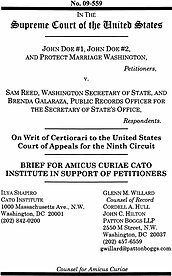Learn more about Cato’s Amicus Briefs Program.
Under Washington’s constitution, a popular vote must be ordered on any bill passed by the legislature if a specified percentage of state voters sign a petition for a referendum. Washington’s Public Records Act (PRA) makes public records, including such referendum petitions, available for public inspection. In 2009, opponents of same-sex marriage used the referendum procedure to attempt to reverse a state law which expands the rights of state-registered domestic partners. Proponents of the law sought access to the petition and two of the petition signers sought a preliminary injunction to prevent disclosure of their personal information, arguing that the PRA violates their right to speak anonymously. The Ninth Circuit Court of Appeals held that the right to access trumps the right to anonymity. The Supreme Court granted certiorari to determine whether the First Amendment right to privacy in political speech, association, and belief requires strict scrutiny when a state compels the public release of identifying information about petition signers, and whether compelled disclosure of such information is narrowly tailored to a compelling government interest. Cato filed a brief supporting the petition signers, in which we argue that the Court should establish a bright-line rule prohibiting laws that mandate the full disclosure of petition signers’ identities and contact information. Public disclosure carries significant burdens and unconstitutionally chills the exercise of First Amendment rights when no compelling government interest is at stake. If the Court finds that the state has a compelling interest in public disclosure, disclosure exemptions are constitutionally required. Failure to require exemptions would permit the government to suppress the expression of offensive or unpopular ideas and would discourage individuals from associating in the first place. Finally, our brief argues that even exemptions are not a substitute for strict scrutiny and provide inadequate protection where disclosure is not justified by compelling state interests. Exemption rules still chill speech, by their nature as an ad hoc process without fixed standards; the government is ill-suited to identify which groups should be exempt from disclosure, as is evidenced by their poor track record of erroneously suppressing controversial or unpopular speech.

This work is licensed under a Creative Commons Attribution-NonCommercial-ShareAlike 4.0 International License.

